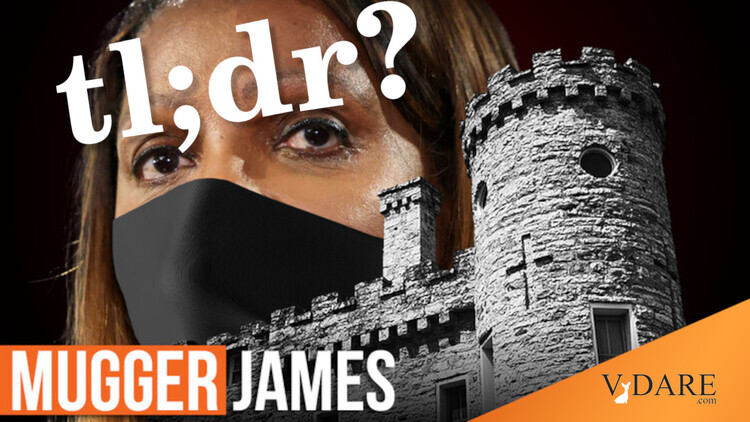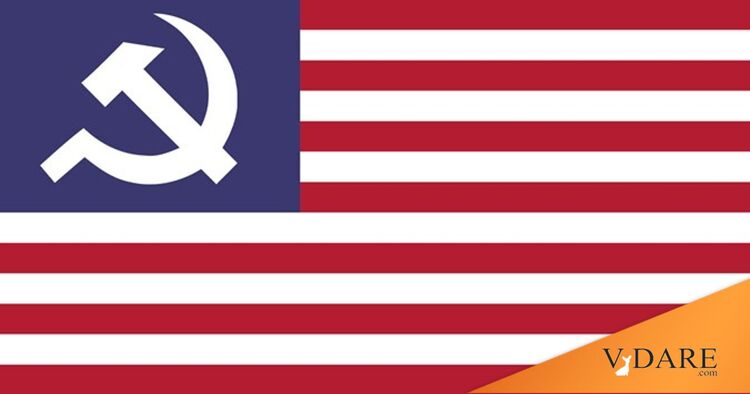The Sick Man of the West. The last few days of February of course have us all talking about Russia and Ukraine.
My fundamental position on the current fracas is isolationist. The European nations are collectively more populous and way richer than Russia. If they can't organize a common defense against aggressive outside powers, that's too bad for their people, but I can't see why it's our business.
Given the uncertainty of Russia's direction after the USSR broke up, I can see a case for the Euros having organized some wary collective post–Cold War defense coalition based on structures that already existed in NATO. I just don't understand why the USA needed to be part of it. We should have packed up and gone home the week after the Warsaw Pact disbanded in February 1991.
All that aside, the path that post–Soviet Russia actually did take needs some explaining—the path, that is, to a lame, uncreative economy under lawless authoritarian government.
Was that inevitable? Might not Russia—and Ukraine, and Belarus—have followed the rest of the West into prosperous hedonism, a decent rule of law, elections only locally and occasionally rigged, and technological creativity? Along with, to be sure, spasms of authoritarianism-lite, postmodern ethnomasochism, and endless bickering about "racism" and how many genders there are…but at any rate no longer sending our armies against each other.
The Russians are white and historically Christian. Their culture—literature, music, art, science—is all in the Western tradition. In almost all aspects they resemble Italians, Britons, Hungarians, Australians, Spaniards, and Norwegians much more closely than they resemble Arabs, Turks, Filipinos, Chinese, Indians, or Africans. So why can't they develop rational, non-despotic politics, as the rest of us Westerners have?
A like-minded listener responded to some similar remarks in my February 18th podcast with comments touching on this issue. With his permission, here are edited extracts from his email.
Mr Derbyshire: You note Russia's tradition of unremitting authoritarianism, or worse. Yes, you could say the same of the Arab world; but the Russians seem like intelligent European people with better options. And yet like Dr Evil in some silly movie, they just don't want to avail themselves of those options.
The Germans and Japanese have killed more Americans that the Russians ever will (I sincerely hope), but they have since embraced democracy and the international system to the benefit of their populations, and the world. As soon as the Eastern European peoples were free to do so, they, too, rushed to join in on the international fun … Just not Russia.
Russia can produce a Sergey Brin, but to found Google or develop a more efficient way to sell shoes or whatever, he'd need to come to the U.S.A. In Russia his computer savvy will be used to produce ransomware or hack someone's Bitcoin account.
At least that's how it seems from this hemisphere, if you don't look too closely and are only aware of Russia when it hits the news, like when they poisoned the journalist in London with a highly sophisticated serum.
You note that Russia doesn't produce anything of export value except first-class weapons, which they are eager to sell to the world's baddest of bad actors, from North Korea to Iran to Venezuela to Syria. Why? At least the Chinese manufacture useful stuff too, in addition to all the mischief.
When I was young we used to attribute the Soviet doping at the Olympics to an ideological need to prove that their system is best. But communism is gone, and they still dope. They are disqualified from competing in the Olympics under the name "Russia" and so have to use the silly "ROC" moniker**—but they still dope! The goddam fifteen-year-old girl needs to be doped up. Can't they even play a friggin' game honestly? …
Thank you for that, Sir.
Sure, there's a lot not to like about the early 21st-century North America, Europe, and Australasia. Goodness knows, I do my share of bitching about our government and society. Still, in matters of liberty, law, security, health, and prosperity we live much better than Russians (and Ukrainians, and Belarusans).
Our leaders are frequently fools and crooks; but they are far preferable to a brutish thug like Putin, and we have mechanisms for getting rid of them. Those mechanisms are less than perfect, and sometimes misused, but nobody gets to be President-for-Life. And look: even when our leaders are crooks, as Biden and his family are, their enablers turn out to be Ukrainian!
What is the matter with the Russians (Ukrainians, Belarusans)?
Do Germany and Japan offer a clue? Is it, for some nations, necessary to suffer crushing defeat in a major war before they can cross the bridge from the aggressive imperial variety of nationalism to the modest, peaceful, economistical modern style—from guns to butter? If that is the case, there are some dark times ahead.
Or is there something older and deeper in play?
Of the main groups of Slavs, the Antes of south Russia were the wealthiest and most powerful, but politically all the Slavs, as well as the related Balts, were very backward. Their myriad chieftains lacked all sense of unity and were therefore easily dominated by other races.
[Colin McEvedy, The Penguin Atlas of Medieval History, my edition 1973. McEvedy is writing about Europe around a.d. 500.]
———————————————————
**Footnote: Watching the Winter Olympics, my eye kept getting caught by that "ROC." The last time "ROC" was used in a nation-naming context it stood for "Republic of China." The government of Taiwan has referred to its jurisdiction thus down to the present day, although ordinary Taiwanese now roll their eyes or snicker at it. When I lived there in the early 1970s it was used unironically, often in the names of commercial products. I recall a brand of ROC soda—yep, you can get the bottle on eBay.

Streets without names. Speaking of Japan: In a post back in January I linked to Arthur Koestler's 1959 account of trying to find your way around Japanese cities.
With its population of nine million citizens, Tokyo-Yokohama is, according to Japanese statistics, the largest city in the world; yet its streets have no names and the houses have no serial numbers …
Among the anonymous millions who inhabit the capital, the large majority lead a life which is confined to their immediate neighborhood; they shop along their street and have few friends or outside contacts, whose houses they locate by memory. The higher strata of the population attach private maps to invitations or business appointments, or send their cars. Postmen must know their clients in the district by name, or locate the addresses by house-to-house inquiry. Taxi-drivers follow a similar procedure; the extra time one must usually allow them for finding an address is about half an hour. The same applies to Ambulances and the Fire Brigade, when called in an emergency.
After posting that link I found myself wondering if this structureless approach has survived to the present day; and if so, how GPS manages with it. I put out queries to people who might know.
A friend who lives in Japan tells me that streets still mostly have no names. He attached a sample Apple map showing part of Osaka.

"Chome" means "district." The city is divided into numbered chomes; each chome is divided into numbered blocks. He:
Google maps and Apple maps still have problems with addresses here though it is much better than it was four years ago when I first visited. Corner houses or telephone poles will have placards showing the chome and block number … most streets do not have any sidewalks.
I wondered if South Korea is similar. There is a Korean congregant at our church, so I asked him. He:
There's a generational conflict. Older people like the traditional Japanese-style system. Younger ones want one that's more GPS-friendly.
This guy's mother still lives in Korea. He calls her by phone regularly. He:
Last year she moved. When I called, I asked her what her new address is. She: "I don't know!"
It's still a big world, with a lot of different ways of doing things.
The joy of bhakri. We lost a friend recently, a neighbor we were much too late striking up an acquaintance with. We had barely gotten to know him and his charming wife when he passed away.
 Although thoroughly Americanized, Harish was originally Indian, a Gujarati-speaker from Bombay. He introduced us to some Indian delicacies; so now I get reminded of him every time I open the snack cupboard.
Although thoroughly Americanized, Harish was originally Indian, a Gujarati-speaker from Bombay. He introduced us to some Indian delicacies; so now I get reminded of him every time I open the snack cupboard.
My favorite, which looks set fair to be a permanent component of my diet, is bhakri—a flat, round wheat biscuit.
I mentally categorize the plain bhakri as "guilt-free cookie." It's crunchy and filling, pleasant to eat, but with no sugar. My gustatory adventurism has not yet advanced into any of the non-plain forms of bhakri.
Scrutinizing the "Nutrition Facts" I see Total Fat at eight percent, which is probably too high, and Sodium at seven percent, likewise. I doubt a bhakri with my morning coffee is going to kill me, though; and I like to fancy Harish smiling down on me as I munch. Thanks, pal…or rather: Dhanyawaad!
Woke associations. On February 18th the excellent Revolver website ran an article about the ABA, the American Bar Association. Guess what: They're woke! And they are forcing that loathsome ideology down the throats of our nation's law schools.
The American Bar Association just mandated wokeness in legal profession
— Darren J. Beattie 🌐 (@DarrenJBeattie) February 19, 2022
But there's one little trick to neuter their political influence
Republicans who want to do something useful -- here's your shothttps://t.co/gWboQnBVbl
The article points out that the ABA can do this because state legislatures let them.
The laws of almost every state in the country strongly encourage aspiring lawyers to earn a degree from an ABA-accredited school. Eighteen US states mandate that all barred attorneys hold a degree from an ABA school. Thirteen of those states voted for Donald Trump in 2020. Twelve of them have unified Republican control of the state legislature and governor's mansion.
The remedy, as the great Calvin Coolidge liked to say, is in the ballot box. The politicization of our legal and judicial systems is one of the most deplorable and dangerous features of American life today; and it's happening because voters let it happen.
Reading the article brought to mind commentary I was writing last Fall about the NSBA, the National School Boards Association, another outfit pushing anti-white radicalism. In September the NSBA had sent a letter to President Biden urging him to bring to bear the Justice Department and all the federal police agencies—FBI, DHS, Secret Service—on parents protesting at school board meetings.
When that letter became widely known there was a national fuss, and rightly so. School boards all over were dis-affiliating from the NSBA.
The ABA, the NSBA.… Should we be looking suspiciously at any organization calling itself "American [X] Association" or "National [XX] Association"? Is there a campaign by George Soros and his minions to infiltrate and take over all of them?
At the very least, if you are a member of, or are affiliated with, the A[X]A or N[XX]A, you should take close looks at their political agenda and their influence on your state legislature.
No whites or Asians need apply. Junior graduated from a respectable university in November with a bachelor's degree in Business Studies. Now he's looking for a job.
Naturally I want to help him. It's been more than twenty years since I had a proper job myself, though, and the number of my contacts in Manhattan business and financial circles has dwindled down to single digits. I have put out polite enquiries anyway, asking whether anyone knows of a vacancy for a smart young man with four years of exemplary military service and a business degree.
One old friend said he'd ask around, but:
Many financial companies have made a "no white men" pledge and according to my brother at [major investment bank], Asians are considered "white adjacent" so they go to the back of the line. It's a very tough situation.
So Junior isn't just the wrong race, he's the wrong races. Good grief!
P.J. on Canadians. On February 15th the writer and former National Lampoon editor P.J. O'Rourke died.
Canada and her inmates were much in the news for most of this month.
 No, P.J. was not Canadian. The two things aren't connected…unless you make them so. Which I shall now do.
No, P.J. was not Canadian. The two things aren't connected…unless you make them so. Which I shall now do.
In hopes that the nightmare of Wokeness will one day pass away, I have preserved for posterity P.J.'s hilariously tasteless article "Foreigners Around the World" from the May 1976 issue of National Lampoon. Here it what it says about Canadians, slightly edited by me.
Racial Characteristics: Hard to tell a Canadian from an extremely boring regular white person unless he's dressed to go outdoors. Very little is known of the Canadian country since it is little visited by anyone but the Queen and illiterate sport fishermen. It is thought to resemble a sort of arctic Nebraska. It's reported that Canadians keep pet French people. If true, this is their only interesting trait. At any rate, they are apparently able to train Frenchmen to play hockey, which is more than any European has ever been able to do.
Good Points: Still have plenty of Indians to abuse.
Proper Forms of Address: Bud, Mac, Mister, Hey you.
Some Examples of Canadian Repartee: Two Canadians are talking in a bar. One Canadian says, "Who was that lady I saw you with last night?"
"That was my wife," replies the other.
A lady is shopping in a Toronto drugstore and accidentally leaves the bottle of aspirins that she bought on the counter. She gets on a bus and the minute the bus has pulled away from the kerb remembers leaving her purchase behind. "My aspirins! My aspirins!" she yells.
And the bus driver says, "Maybe you left them in the drugstore."
A little Canadian boy named Johnny Fuccarada is screwing a little girl under the porch of his house. His mother comes out the door and yells for him, "Johnny! Johnny Fuccarada!"
"I'll be there in a minute," he says.
The mighty pull of human exceptionalism. Steve Sailer noted the February 16th bicentenary of Sir Francis Galton by posting some of Steve's own brilliant 2014 essay "The Rise and Fall of Statistics."
Steve 2014:
As best as I can understand this pattern over the millennia, celestial questions involving geometry were traditionally seen as higher, purer, cleaner than earthier matters, and thus they attracted the finest minds. Mucking around with human data must have seemed sublunary, déclassé.
To this day, statistical reasoning still strikes many as being in dubious taste. Larry Summers was let go as president of Harvard after pointing out that males tend to have larger variances in IQ than females. Similarly, Jason Richwine lost his job last year after it was revealed that his Harvard doctoral dissertation, IQ and Immigration Policy, was a sophisticated statistical analysis of matters of grave national import.
Steve 2022 adds: "Today, of course, fear and loathing of honest statistical analyses are a dominant feature of the intellectual landscape."
Indeed: although it's "mucking around with human data" that generates all the shrieking and fainting. "Cold" statistics, as used routinely in areas like industrial quality control, generates no fuss.
What you see here is the mighty gravitational pull of human exceptionalism. There is a very widespread, very strongly held belief that we are outside nature. Statistics as applied to stars and planets, the manufacture of widgets, the growing of crops or the breeding of livestock—no problem. Statistics as applied to Homo sap.—Eeeek!
I got a schooling in human exceptionalism when working at National Review. A lot of the readers and some of the contributors were religious creationists. In 2005, after I had published a piece scoffing at "Intelligent Design," the Discovery Institute, a creationist think-tank, sent an expeditionary force across from Seattle to try to get National Review back on the creationist rails.
Religious creationism doesn't get much air time any more, for reasons I set out on Radio Derb three years ago. The torch of human exceptionalism has been passed to the wokesters—along with, apparently, the torch of religious enthusiasm in all generality.
Our human nature is above biology and impervious to statistical analysis. No such thing as sex! No such thing as race! If, like Sir Francis Galton (or Larry Summers, or Jason Richwine, or Charles Murray), you disagree, you are a bad, bad person.
A brush with greatness. A reader is curious to know whether I have had any further exchanges with Mr. Arbuthnot, the world's foremost cliché expert, since our encounter in an elevator twelve years ago this month.
I'm sorry to say I haven't; nothing of that length at any rate. Towards the end of February, though, I did happen to spot Mr. Arbuthnot as he was getting into a cab in midtown Manhattan. I managed to waylay him very briefly.
Q: Mr Arbuthnot, I understand you have taken a speechwriting position in the Biden administration. How's that working out?
A: I'm real busy, can't stop. Things are at an inflection point, y'know?
Q: I understand. Just tell me how you see the current crisis, Russia and Ukraine.
A: Going forward? Could be existential!
Q: Good heavens! Is the administration planning a military response, then?
A: Nah, that's not who we are.
Q: Then what?
A: Whoa. You're not working for Fox News, are you? Asking for a friend.
Q: No, I'm independent.
A: Hm. Sorry, gotta put a lid on it. Stay well!
With that, and a brisk gesture to his driver, he was gone.
Gun lovers rock! The story so far.
- I was a happy, law-abiding owner of handguns for twenty years. Then
- In 2019 our son got into a barroom scuffle. The counterparty got an order of protection against him. Junior was living with us at the time; our address came up in some database search; and I had to surrender my handguns and permit under a "red flag" law.
- The following year, my permit still held at the Police Department Property Section with my guns, it expired. I got a letter of cancellation from the Pistol Licensing Bureau
- After some wrangling, I was left with no choice but to apply for a new permit. I dithered for a few months. Then
- Last November I got a letter from the Property Section. My handguns had been declared lost property. If I didn't claim them within three months, they would be destroyed.
- Stirred to action, I did the paperwork to get a new permit. When I submitted it they told me applications were backed up for a year and a half. So I'll be getting my permit around mid-2023.
- What to do about my guns, still at the Property Section? If I didn't claim them they'd be destroyed; but without a permit I couldn't go and claim them.
That was the state of play at the beginning of February. I needed a licensed Suffolk County pistol-permit holder to collect my guns and take custody of them. I only know one such; but he's in poor health and I was reluctant to impose on him. It's a 45-minute drive to the Property Section.
I asked my local gun store for advice. They were wonderfully helpful. After I had signed my name to some paperwork and paid a small fee, the store manager himself drove over to the Property Section and retrieved my handguns. He then purchased them from me for a very fair price (judging by the price tags on similar guns in his store display).
Problem solved! Thank you, Sir.
That's one more experience I can add to many others of the real fellowship you find among gun enthusiasts. We help each other out. I don't know if it's necessarily true, as Robert A. Heinlein said, that "an armed society is a polite society," but I've never had anything but help and courtesy from gun folk. (And no, I don't count the uniformed and totally un-helpful paper-shuffling seat-warmers at the Pistol Licensing Bureau.)
Math Corner. I've just been looking at the results of the Putnam math competition, held last December. East Asian dominance is more pronounced than ever. Surnames:
- Five highest-ranking individuals (each wins $2,500): Gu, Ren, Wan, Zhang, Zhu.
- Next ten highest-ranking individuals (each wins $1,000): Bisain, Chen, Jiang, Kim, Li, Liu, Liu, Singhal, Walsh, Yao.
- Next twelve highest-ranking individuals (each wins $250): Garg, Guo, Kwon, Lu, Ma, Mui, Ren, Rong, Schildkraut, Shin, Wang, Xu.
Even more striking is the near-sweep by MIT:
- Five highest-ranking individuals: all five.
- Next ten highest-ranking individuals: all but one (Stanford).
- Next twelve highest-ranking individuals: all but three (Princeton, Princeton, Harvard).
For a challenging math education, it looks as though MIT is the place to go, if you don't mind sitting in class with a lot of super-smart East Asians.
Brainteaser: Just a back-of-an-envelope quickie; a topical one of my own devising. And no, you won't find the answer in the OEIS, although you will find references to my November 2002 and June 2011 brainteasers.
What is the next number in the sequence 242, 682, 1562, 3110, 5602, 9362, 14762,…? Why is it topical?


 John Derbyshire [
John Derbyshire [








